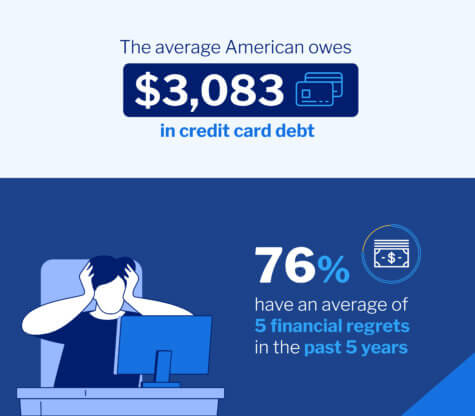
NEW YORK — Most Americans are currently carrying so much credit card debt that they would do anything to go back in time and change the outcome of their financial situation.
That’s according to a recent survey of 2,000 adults that examined how they tackle their financial hurdles. The poll found that the average person owes $3,083 on their credit cards. Many respondents shared their financial regrets over the years, from not setting up a retirement plan when they were younger (51%), to not paying close attention to their credit score (43%) and buying goods that were too cheap (41%).
Three-quarters (76%) have made an average of five financial decisions they regret in the past five years. The same percentage of people have even planned their “debt-free” celebrations after paying all their dues.
Who do you trust when the bills pile up?
Conducted by OnePoll and commissioned by TrueAccord, a digital debt collection company, the study revealed 77 percent of respondents have lost an average of nine hours of sleep per week due to their financial woes.
When they’re in a financial crisis, 63 percent will turn to someone they trust — with half turning to their parents, 48 percent to their best friend, and 46 percent to their primary bank. Overall, 87 percent of people credit their financial “wins” to the people who gave them advice, while seven in 10 say they’ve learned from other people’s financial mistakes (71%).

“There are close to 80 million Americans with past-due debt and most want to pay it off and move on with their lives,” says TrueAccord founder Ohad Samet in a statement. “But that is exceedingly difficult, especially in a debt collection system that treats consumers poorly and is more interested in process than simplifying debt repayment.”
“What we see more and more are consumers in debt who want to pay off their balances but are met with challenges of communicating with collectors, financial literacy and budget considerations that create roadblocks to being debt-free.”
Most people are keeping score
The average person doesn’t understand the importance of their credit score until they’re 28 years-old but believes it’s better to start building credit at 25. Over four in five people (84%) say maintaining a good credit score is important to them, with nearly as many (81%) saying it’s even more crucial than their social lives.
Respondents also shared how they feel when they see their credit card statements and when they’re about to make a payment. Three in 10 feel confident and 24 percent feel fear upon looking at their financial statements. On the other hand, people feel satisfaction (36%) and happiness (22%) when they finally make that payment.
While 38 percent don’t plan on taking out any loans in 2022, many are making plans to do so — including credit card loans (34%), personal loans (33%), and mortgages (30%).
“For those who can repay their balances, there may still be a longer-lasting impact to their credit score that can be difficult to remedy and further inhibit financial stability,” Samet explains. “People will continue to borrow money when they need it, but what’s important is that they are informed on loan or credit terms and have a financial plan in place to ensure they’re making smart spending and repayment decisions. At the end of the day, getting into collections is often the result of trauma — loss of work, a healthcare crisis, and so on — many of them unexpected.”
